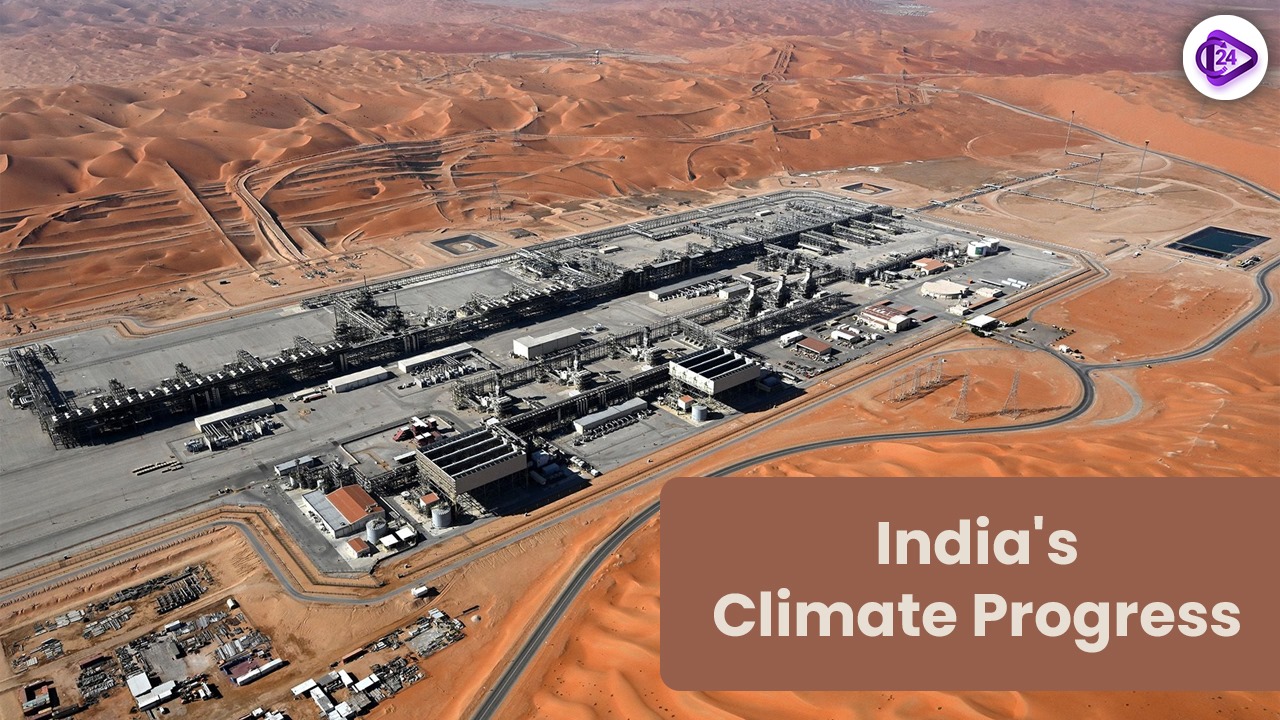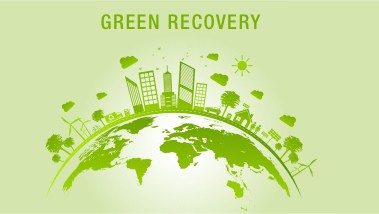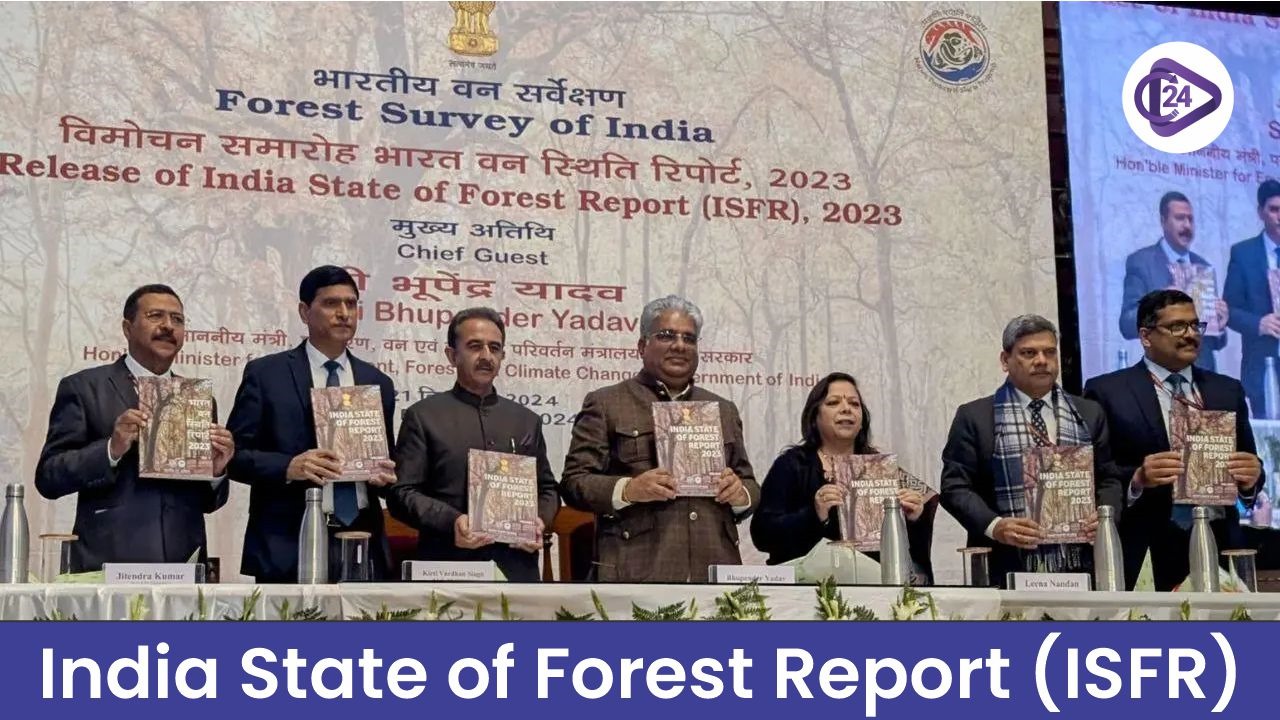
India has once again come forward for climate war by submitting its 4th Biennial Update Report (BUR-4) to United Nations Framework Convention on Climate Change (UNFCCC) on 30th December, 2024. The report documents India’s advancement in the concept of sustainable economic development by providing the National Greenhouse Gas (GHG) Inventory for the year 2020 and important milestones under the climate change plan.
About the BUR-4 Report
-
Reduction in GHG Emissions
-
India’s total greenhouse gas emissions without (excluding Land Use, Land-Use Change, and Forestry - LULUCF) for the year 2020 were 2959 million tonnes of CO2 equivalent.
-
Net emissions, including (excluding Land Use, Land-Use Change, and Forestry - LULUCF) totalled 2,437 million tonnes of CO2 equivalent and were 7.93% lower than 2019.
-
The energy sector implemented the broadest amount of emissions, 75.66% while the agriculture was 13.72% for industrial processes and product use at 8.06% and waste at 2.56%.
-
-
Role of Forest and Tree Cover
-
Those of forests and trees absorbed 522 million tonnes of CO2 in 2020, the equivalent of ‘neutralizing’ 22% of total carbon dioxide emissions.
-
During the period 2005- 2021 the additional carbon sink of CO2 was 2.29 billion tones.
-
-
Emission Intensity and Renewable Energy Growth
-
Despite its rapid economic growth, India saw a 36% decline of its CO2 intensity of GDP between 2005 and 2020, clear evidence of an improved climate-change-embedded eco-efficiency.
-
About 46.52% of the cumulative installed electricity generation capacity in India attained the set mark by October 2024 to align with the fossil-free development drive, meaning that renewable energy has expanded significantly.
-
-
Forest and Tree Cover Expansion
-
India’s forest and tree cover stands at 25.17 % of geographical area base further affirming India’s commitment towards afforestation and wildlife conservation.
-
‘Highlights Of India Under NDCs’
India’s BUR-4 details significant milestones under its climate goals:
-
Renewable Energy Expansion:
-
Cumulative renewable electricity generation and capacity was 203.22GW with generation of 156.25GW in 2024 from 35GW in march 2014 excluding large hydro power projects for new installed capacity.
-
-
Proactive Climate Action:
-
Though historically and currently contributing little to carbon emissions, India has been quite assertive of climate change policies.
-
Activities demonstrating the Application of Principle of Equity & CBDR-RC – UNFCCC & Paris Agreement.
-
Remark by Union Environment Minister
Union Minister for Environment, Forest, and Climate Change, Shri Bhupender Yadav, pointed at India as one of the world leaders in achieving sustainable development. He said the achievements are evidence of PM Shri Narendra Modi’s policy direction of making the country an economic power while at the same time ensuring sustainable development.
India’s Vision
Down below, the new Indian BUR-4 exemplifies New Delhi’s commitment to fight climate change in pursuit of development goals.
Climate Change: A nation with a very low individual carbon dioxide emissions, India remains an active participant in world climate policy making. On the three pillars of renewable energy, afforestation, and emission throughput rate, it can be seen that India is on track towards its 2030 Paris Agreement goals.
Conclusion
India’s 4th Biennial Update Report to the UNFCCC highlights significant progress in addressing climate change through emission reductions, renewable energy expansion, and afforestation efforts. The country has made remarkable strides in reducing its carbon intensity while simultaneously fostering economic growth. With a commitment to the Paris Agreement and sustainable development, India continues to lead by example on the global climate stage. The BUR-4 report underscores India's dedication to combating climate change and achieving its 2030 climate goals, setting a benchmark for other nations to follow.
Chat With Us



 Union Shipping Ministry Great Nicobar Island Project
Union Shipping Ministry Great Nicobar Island Project Chhattisgarh Pioneers Green GDP Initiative: Some Consideration Towards Sustainable Development
Chhattisgarh Pioneers Green GDP Initiative: Some Consideration Towards Sustainable Development Nari Shakti Se Jal Shakti Initiative: Empowering Women for Water Conservation
Nari Shakti Se Jal Shakti Initiative: Empowering Women for Water Conservation India’s Green Recovery: Forest Conservation Milestones and Initiatives
India’s Green Recovery: Forest Conservation Milestones and Initiatives Nexus Report Highlights Interconnected Global Crises: Climate Change, Biodiversity Loss, and Hunger
Nexus Report Highlights Interconnected Global Crises: Climate Change, Biodiversity Loss, and Hunger ISFR 2023: Key Findings on India’s Forest Cover & Climate Goals
ISFR 2023: Key Findings on India’s Forest Cover & Climate Goals Supreme Court Directs Policy Formation for Sacred Groves Conservation
Supreme Court Directs Policy Formation for Sacred Groves Conservation India’s first-ever tagging of dolphins in the river Ganga was conducted in Assam.
India’s first-ever tagging of dolphins in the river Ganga was conducted in Assam. Jalvahak Scheme: Revolutionizing Inland Waterways in India
Jalvahak Scheme: Revolutionizing Inland Waterways in India






